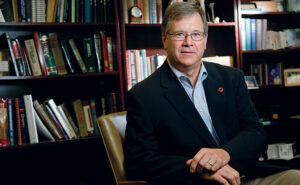
Tim Foutz
Tim Foutz has seen a great deal of change during his 28 years as a member of UGA’s engineering faculty. In fact, Foutz has been at the center of many of those changes. For his contributions to the College of Engineering and the University of Georgia, Foutz is one of five faculty members named Josiah Meigs Distinguished Teaching Professors, the university’s highest recognition for excellence in instruction at the undergraduate and graduate levels.
When he joined UGA in 1988, the university had an engineering department that offered a single undergraduate degree in agricultural engineering and enrolled about 50 students. Almost immediately, Foutz became a leader in efforts to offer a second degree, biological engineering, and to build a more vibrant engineering design curriculum.
“Previously, the department was focused on the technical aspects of engineering and not on aspects of engineering that impact the human condition,” Foutz said. “I believed we needed to develop a complete program focused on infusing concerns from the social sciences and humanities into the science of engineering design.”
Foutz led the development of new instructional models designed to help both students and instructors reflect on the broader impact of engineering solutions. The program presented engineering design as a social process rather than simply applying math and science to a particular challenge. After a quarter century, this program of study remains a distinctive cornerstone of instruction in the UGA College of Engineering.
“For a non-tenured assistant professor to take a stand and point out our inadequacies in an area central to engineering education was quite bold,” said Sidney Thompson, the college’s U.H. Davenport Professor of Biological & Agricultural Engineering. “Countless engineering students at UGA have greatly benefited in the workplace due to his efforts related to engineering design.”
Foutz’s impact on instruction reaches across campus. He was the inaugural director of the First-Year Odyssey Seminar.
“I tried to listen to the instructors participating in First-Year Odyssey and help them find ways to blend their scholarship into a format that builds students’ capacity to question, challenge and evaluate information,” Foutz said. “It was incredibly rewarding to have a chance to impact faculty and in turn see the faculty impact students.”
Always looking for opportunities to enhance the learning experience for students, Foutz recently helped launch a collaboration between the College of Engineering and the physics and astronomy department in the Franklin College of Arts and Sciences. DEEP, Developing Excellence in Engineering and Physics, is designed to provide more student services to academically talented students with a demonstrated financial need.
“I’ve always viewed my role as finding ways to help students figure out how they’re going to learn and how they’re going to be successful for the rest of their lives,” Foutz said.


